Governorship election: How did Kogi Central produce shocking 300,000+ votes?

Key points:
-
IReV, data reveal frauds in 2023 Kogi governorship election
-
Results make nonsense of N105bn investment in BVAS, IReV
-
Figures at variance with those of previous senatorial and governorship polls
-
What Electoral Act says about over-voting
-
‘INEC must arrest, investigate and prosecute officials who compromised’
The data on the INEC Result Viewing Portal (IReV) has revealed how the controversial election results that emerged from Kogi Central Senatorial District were realized.
The electoral umpire, the Independent National Electoral Commission (INEC), in 2022, acquired the devise in its attempt to ensure the credibility of elections. On November 16, 2022, the chairman of INEC, Professor Yakubu Mahmoud, promised Nigerians that the technology would tame the frauds that contaminated previous elections in the country.
He had said, the decision to use the device and IReV has come to stay: “As I have said repeatedly, the Commission’s allegiance is to Nigeria. Our loyalty is to Nigerians who want free, fair, credible and verifiable elections supported by technology, which guarantees transparent accreditation and upload of polling unit results for citizens to view in real-time on Election Day. It is for these reasons that the Bimodal Voter Accreditation System (BVAS) and the INEC Result Viewing Portal (IReV) were introduced. There is no going back on the deployment of BVAS and IReV for the 2023 General Election.”
The INEC acquired BVAS and IReV facilities for N105 billion, an amount that was one of the major costs of conducting the 2023 elections.
It was not only INEC that expressed confidence in the potential of the technology to curtail electoral fraud. Nigerian politicians, especially those in the opposition, shared the confidence that the technology would create a level playing field for contestants in the 2023 elections.
The off-season governorship election in Kogi State held on Saturday, November 11, 2023, with more than a dozen flag bearers. During the campaigns, about five contestants stood out. Alhaji Usman Ododo held the highly controversial All Progressives Congress (APC) ticket. Senator Dino Melaye flew the banner of the Peoples Democratic Party (PDP), and Murtala Yakubu Ajaka had the Social Democratic Party (SDP’s) ticket.

L-R: Dino Melaye, Alhaji Usman Ododo and Murtala Yakubu Ajaka. Photocredit: Online
The state was tore along ethnic and geopolitical lines, though each of the contestants attempted to make in-roads into the strongholds of their competitors. They are three senatorial districts: Kogi East, Kogi West and Kogi Central.
However, the outcry about the results are about the supposed fraudulent over-voting in the Kogi Central Senatorial District. From the portal, the source of fraud in the polls was obvious. The disputed results from the Kogi Central Senatorial District have a distinct feature from other results from polling units in both Kogi East and Kogi West Senatorial District.
In Kogi Central, the number of accredited voters captured by the BVAS machine and loaded on IReV between Saturday, November 11 and the afternoon of Monday, November 13, about 50 hours after the elections were completed and results announced, were at variance with the number of accredited voters captured on result sheets. As a result of the loud outcry in the media, INEC officials perfected the fraud by adjusting the number of accredited voters to align with the fraudulently inflated figures on the result sheets.
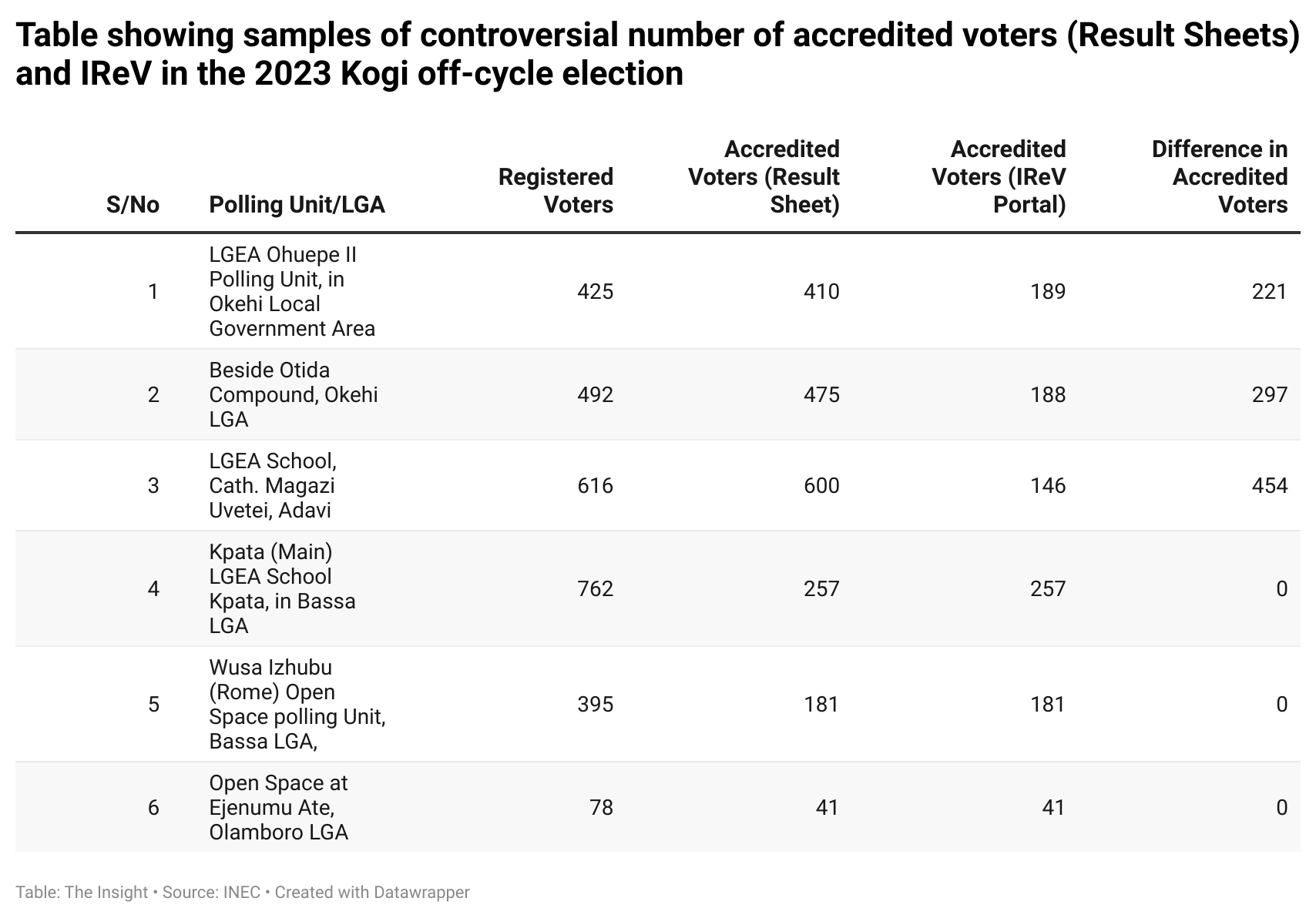
Examples of irregularities in accredited voters in Kogi Central:
At the LGEA Ohuepe II Polling Unit, in Okehi Local Government Area, the number of accredited voters captured on IReV was 189. However, the number of accredited voters on the result sheet was 410, out of a total number of registered voters of 425. Also, at the polling unit Beside Otida Compound, still in Okehi LGA, the total number of accredited voters recorded on IReV was 188, but the number captured on the result sheet was 475 accredited voters out of the registered voters of 492.
In Adavi Local Government Area, still in Kogi Central, the following discrepancies were glaring on the portal. At the LGEA School, Cath. Magazi Uvetei polling unit, the total number of accredited voters on IReV was 146, but the number written on the result sheet was 600 out of a total number of registered voters of 616. The pattern of inconsistencies are recorded in all the polling units results checked by this reporter.
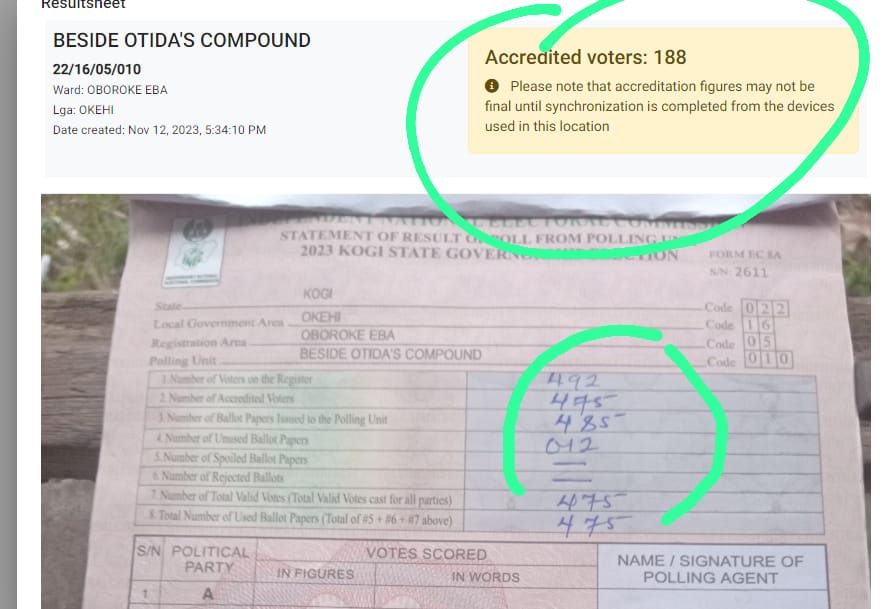
Sample of result sheet with over-voting Credit: INEC IReV
The results from other senatorial districts showed the consistency between the number of accredited voters captured on result sheets and by the IReV. For instance, at the polling unit in Kpata (Main) LGEA School Kpata, in Bassa Local Government Area, the number of accredited voters on IReV is 257. It aligns with the number recorded on the result sheet – 257. Here the total registered voters as captured on the result sheet is 762.
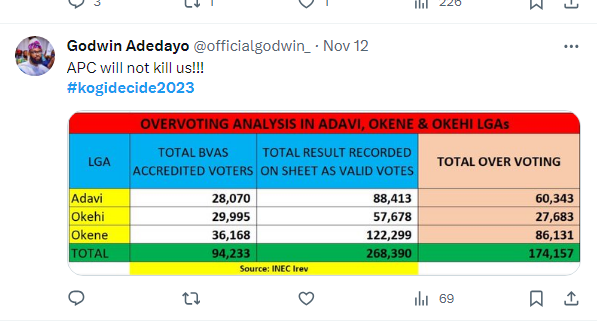
Also, at Wusa Izhubu (Rome) Open Space polling Unit in Bassa LGA, IReV captured accredited voters is 181, and the total number of accredited voters is 181, out of a total of 395 registered voters.
It goes as well at the Open Space at Ejenumu Ate polling unit in Olamboro LGA. At the centre, the total number of accredited voters captured by IReV is 41, the same number captured on the result sheet, out of a total registered voters of 78.
What does the law say?:
Section 51 of the Electoral Act says: “ Section (2) Where the number of votes cast at an election in any polling unit exceeds the number of accredited voters in that polling unit, the Presiding officer shall cancel the result of the election in that polling unit. (3) Where the result of an election is cancelled in accordance with subsection (2), there shall be no return for the election until another poll has taken place in the affected polling unit.”
However, instead of cancelling the votes from the polling units affected in Kogi Central Senatorial District, the INEC presiding officers permitted the discrepancies and announced the tainted results that produced APC’s Usman Ododo as winner.Why were the discrepancies prevalent only in Kogi Central Senatorial District? From fillers, it was because the result sheets had been pre-filled result sheets by some dark forces. Why did INEC turn deaf ears to the revelation and nationwide outcry to cancel the disputed votes? No INEC officials gave any explanation.
There shall be no return for the election until another poll has taken place in the affected polling unit
Fantastically fraudulent ‘turnout’ in Kogi Central in 2023 Governorship poll:
Apart from the discrepancies revealed on the IReV portal, the turnout at the polling units in Kogi Central, as recorded in the result sheets, are not credible, compared with the turnout in previous elections.
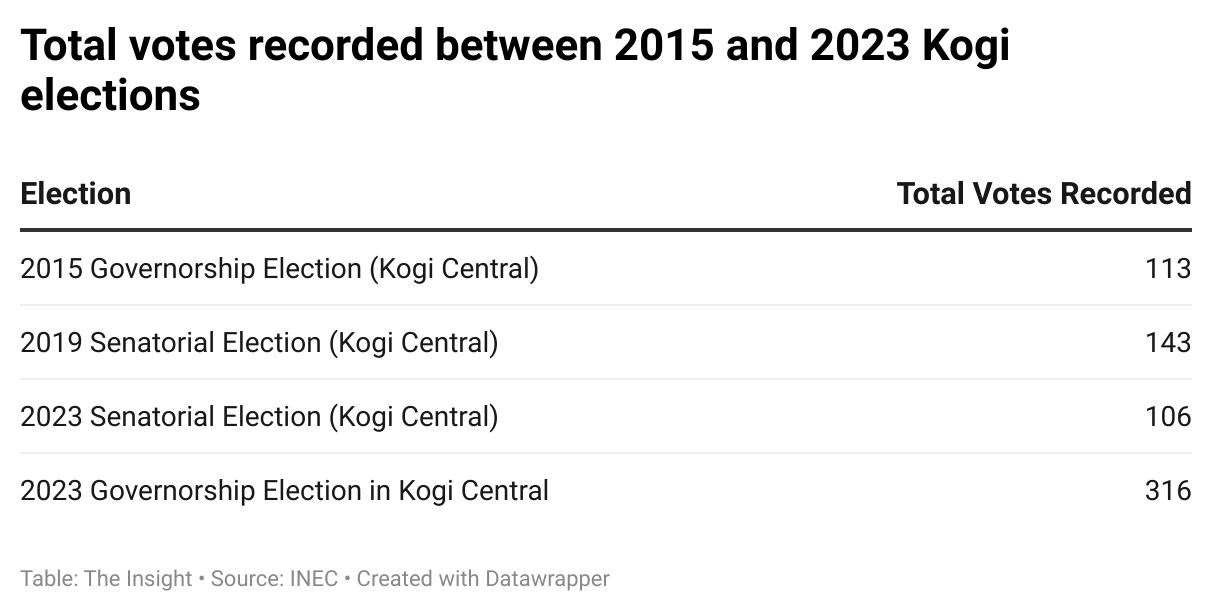
For instance, in the 2015 governorship election, contested keenly by the APC and PDP, the total number of votes that emerged from Kogi Central was 113,065.
In the 2019 senatorial election in Kogi Central, the cumulative votes obtained by the candidates that contested was 142,591.
Also, in the highly contested senatorial election in 2023 in Kogi Central, the votes that all the parties garnered was 105,920. The 315,846 that the APC posted from Kogi Central Senatorial District in last Saturday’s governorship election was almost three times the number of votes in any of the previous elections referred here.
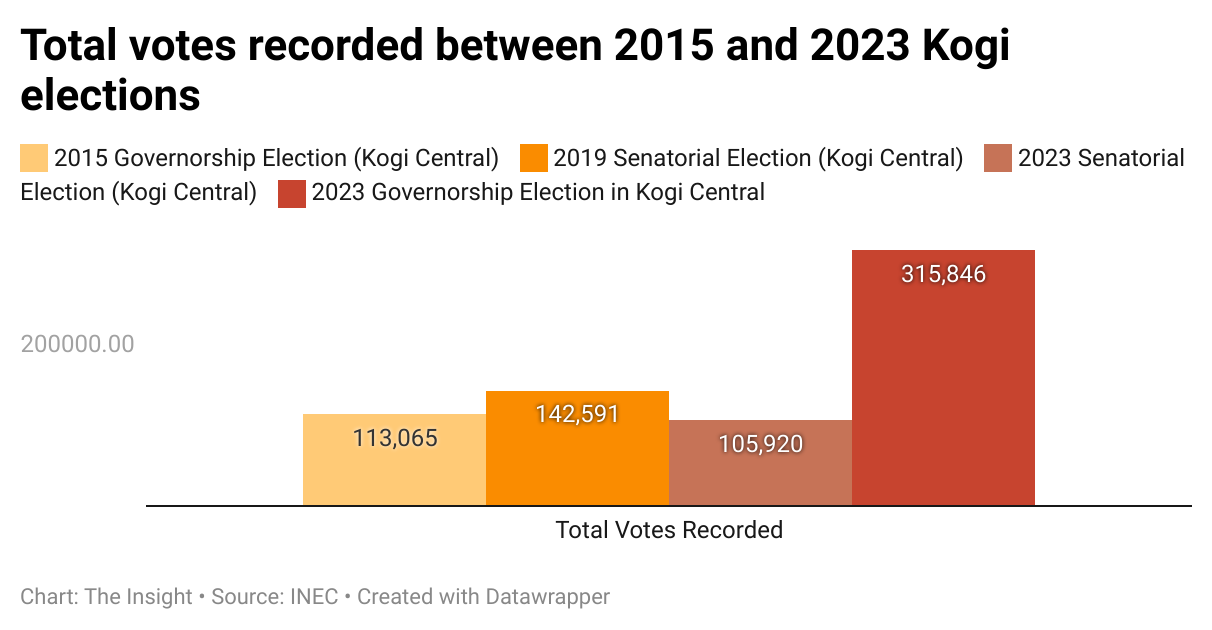
From the total votes declared by INEC in last Saturday’s election, the electoral body would want Nigerians to assume that the turnout at the election in Kogi Central was three times what the turnout was in the 2023 presidential election. For the whole of Kogi State, the total votes in the presidential election on February 25, 2023 was 446,310, out of which about 110,000 was obtained from Kogi Central. But in last week’s governorship election, the votes have heightened to 747,651 for the state, an excess of 306,351 votes!
INEC’s initial statement:
The inflated votes were suspected to be as a result of pre-filled results sheets, not based on actual voting. Last Saturday, the social media was awash with outcries over pre-filled result sheets, as well as the failure of electoral officers to produce result sheets for recording the counted votes. In several polling units, the confusion led to a face-off between electoral officers and party agents.
In its reaction, INEC said, “Our attention has been drawn to a report that filled result sheets were discovered in some polling units in Kogi State. The Commission views this situation seriously. Our senior officials deployed to the State are currently investigating the incident(s). The Commission will communicate its decision earnestly…”
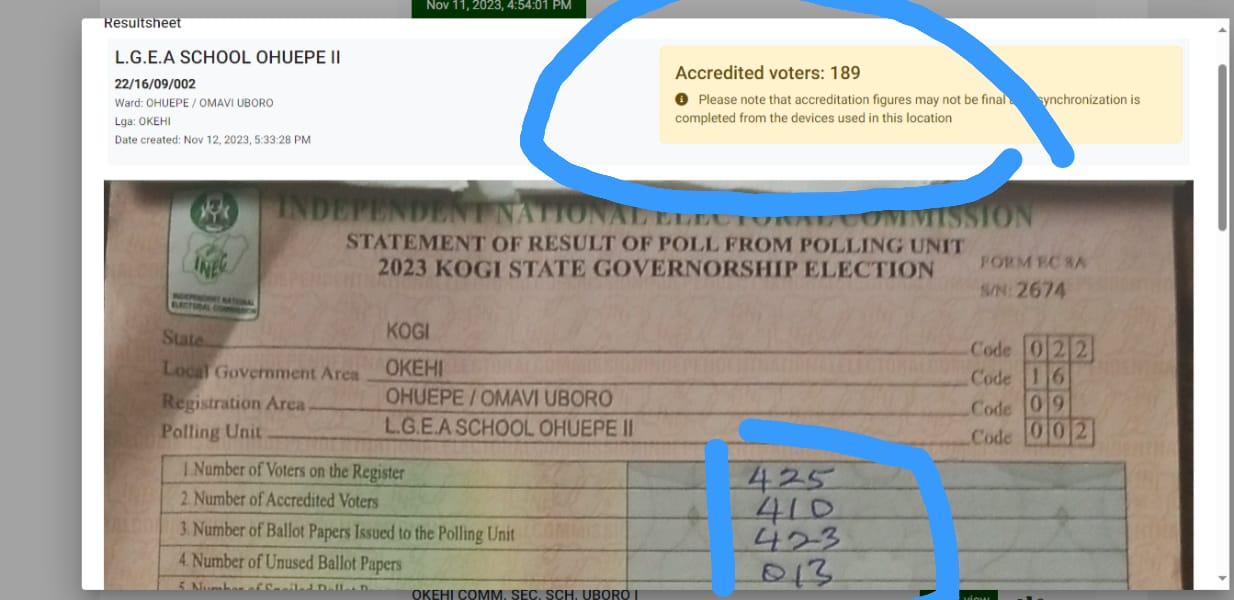
The Commission initially promised to conduct re-run polls at the polling uints where complaints were lodged about pre-filled results. However, INEC rescinded that decision because 15,136 voters for the polls was less that the margin of lead between Ododo and other contestants. The electoral umpire rather declared the APC candidate winner and governor-elect of Kogi state.
Professor Yakubu Mahmoud, promised Nigerians that the technology would tame the frauds
Nigeria’s Civil Society Organizations are united in the call for the cancellation of the controversial results, and for INEC to conduct fresh polls. They also call for the arrest, investigation and prosecution of its officials involved in the shameful act.
But there are doubts if the INEC would adhere to the counsel.
Dr Theophilus Abbah is a Fellow of the Chartered Institute of Forensics and Certified Fraud Investigators of Nigeria
Sign up for The Insight Newsletter
Get in-depth, research and data-based interpretative reports from around Nigeria.



